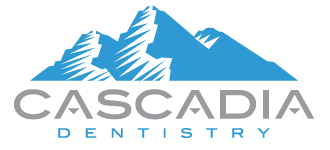
We are excited to announce the installation of a new digital cone beam CT machine at Cascadia Dentistry! Cone beam CT (CBCT) technology is a great tool for diagnosing a variety of conditions as it gives us a three-dimensional view of the hard tissue of your skull allowing us to map critical areas such as your trigeminal nerve and maxillary sinus without exploratory surgery. A CBCT scan is instrumental in treatment planning for any implant placement and restoration and has quickly become the standard of care. Once a scan is obtained it even allows us to fabricate surgical guides for surgeries like sinus lifts and implant placement(s) which ultimately makes your surgery easier.
Previously we utilized a third-party service to acquire CBCT scans which required scheduling and payment through a mobile service which was just another hurdle to get through when planning for your surgery. The ability to take CBCT scans on site will remove that hurdle altogether and provides us easy access to obtaining any scans as we need them.
We are very pleased and excited to announce this new development at our office. We always strive to balance the need for advancing our technology with the timing that will best serve our patients. If you would like to discuss how this change may serve your dental needs, please do not hesitate to contact us at 360-629-7229.

 Occasionally, patients will ask for guidance with the use of fluoride as it relates to their dental care. I understand their concerns as there can be some misinformation about its risks. I have talked about the many benefits of fluoride use before and continue to remain a firm advocate of its responsible use based upon the extensive research conducted on this naturally-occurring compound. Per the American Dental Association (A
Occasionally, patients will ask for guidance with the use of fluoride as it relates to their dental care. I understand their concerns as there can be some misinformation about its risks. I have talked about the many benefits of fluoride use before and continue to remain a firm advocate of its responsible use based upon the extensive research conducted on this naturally-occurring compound. Per the American Dental Association (A As the current opioid epidemic continues to grow and impact communities across our nation, one of the challenges I face as a dental provider is assisting my patients in very real pain while also considering the body of evidence linking opioid overprescription with addiction. To address this correlation, I’d like to briefly discuss the practices I have always followed in prescribing pain relievers. First, there are many compelling studies that show that taking Ibuprofen and Acetaminophen together at certain dosages are more effective than traditional opioid medications (see
As the current opioid epidemic continues to grow and impact communities across our nation, one of the challenges I face as a dental provider is assisting my patients in very real pain while also considering the body of evidence linking opioid overprescription with addiction. To address this correlation, I’d like to briefly discuss the practices I have always followed in prescribing pain relievers. First, there are many compelling studies that show that taking Ibuprofen and Acetaminophen together at certain dosages are more effective than traditional opioid medications (see  As with everything, technology in dentistry is always improving and changing. As a result, we are always striving to find the best technology to improve the quality and outcome of your dental experience. Along these lines, I am pleased to announce our latest investment: introducing the Vita Easyshade V. The Vita Easyshade V is a tool for taking “custom” teeth shades at the chair without having to rely solely on our eyes. This is important because the slightest difference in tooth shades can really stand out, especially in the front or the “esthetic zone”. Relying on our eyes, alone, is not always sufficient and having another tool in our arsenal for some of the more difficult shade matches is meant to take some of the guess work out of the process. This tool has a great track record, already, and is known as the best digital shade detection system on the market. All we have to do is point the Vita Easyshade at a tooth and it will digitally measure the shade of your existing teeth. It’s that easy!
As with everything, technology in dentistry is always improving and changing. As a result, we are always striving to find the best technology to improve the quality and outcome of your dental experience. Along these lines, I am pleased to announce our latest investment: introducing the Vita Easyshade V. The Vita Easyshade V is a tool for taking “custom” teeth shades at the chair without having to rely solely on our eyes. This is important because the slightest difference in tooth shades can really stand out, especially in the front or the “esthetic zone”. Relying on our eyes, alone, is not always sufficient and having another tool in our arsenal for some of the more difficult shade matches is meant to take some of the guess work out of the process. This tool has a great track record, already, and is known as the best digital shade detection system on the market. All we have to do is point the Vita Easyshade at a tooth and it will digitally measure the shade of your existing teeth. It’s that easy!